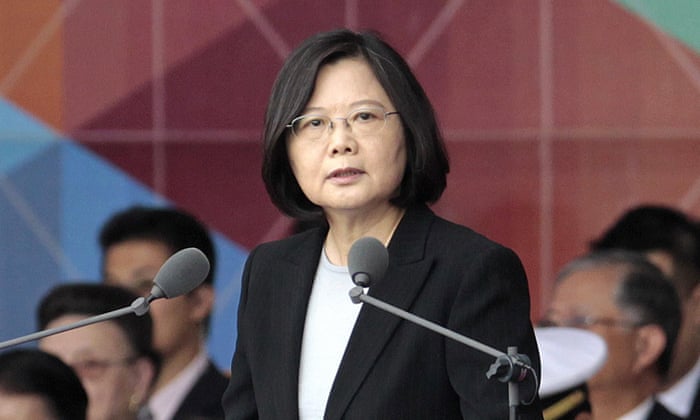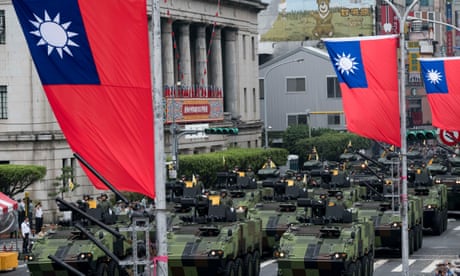By Simon Tisdall

President Tsai Ing-wen. Taiwan has been self-governing and de facto independent since the end of China’s civil war.
Taiwan’s president is planning to meet members of Congress next month during a stopover visit to the US that will go ahead despite strong Chinese government objections, a senior Taiwanese official has said.
China tried to block the visit by President Tsai Ing-wen in the wake of a row over pro-Taiwan comments by president Donald Trump who also held an unprecedented phone conversation with the Taiwan leader.
The visit has caused speculation in Washington and Taiwan that Tsai may meet Trump in person during a nine-day trip that begins on 7 January and includes brief state visits to Honduras, Nicaragua, Guatemala and El Salvador.
Speaking to the Taiwan legislature’s foreign and national defence committee, Javier Hou, deputy foreign minister, said Tsai’s planned stopover in the US would be made in accordance with past practice.
The foreign ministry was seeking to arrange for Tsai to meet members of the US Senate and House of Representatives, Hou said.
The exact locations of the meetings, and the duration of the stopover, have yet to be announced. Trump’s transition HQ is in New York.
Trump infuriated China’s leadership when he spoke to Tsai on the phone and later made separate comments questioning the longstanding “one China” policy, under which the US notionally accepts Beijing’s view that Taiwan is part of China.
Trump infuriated China’s leadership when he spoke to Tsai on the phone and later made separate comments questioning the longstanding “one China” policy, under which the US notionally accepts Beijing’s view that Taiwan is part of China.
The US does not officially host Taiwanese leaders.
Taiwan has been self-governing and de facto independent since the end of China’s civil war.
Taiwan has been self-governing and de facto independent since the end of China’s civil war.
Beijing regards it as a renegade province.
Alex Huang, spokesman for Taiwan’s presidential office, denied that the planning or disclosure of the transit stops were being delayed due to pressure from China.
Alex Huang, spokesman for Taiwan’s presidential office, denied that the planning or disclosure of the transit stops were being delayed due to pressure from China.
“There is no problem of that kind,” Huang said.
But China this week reiterated its strong objection to Tsai and her 90-strong government delegation touching down on US soil, claiming that allowing her to do so would “send wrong signals to Taiwan independence forces”.
But China this week reiterated its strong objection to Tsai and her 90-strong government delegation touching down on US soil, claiming that allowing her to do so would “send wrong signals to Taiwan independence forces”.
Hua Chunying, China’s foreign ministry spokeswoman, suggested that Tsai, whose ruling Democratic Progressive party is viewed with deep suspicion in Beijing, would use the trip to rally diplomatic and political opposition to China.
“As for the question of the leader of the Taiwan region possibly transiting the United States, I think her real aim needs no explanation,” Hua said.

Any meeting between Tsai and Trump would be politically explosive, coming so close to Trump’s inauguration on 20 January.
“As for the question of the leader of the Taiwan region possibly transiting the United States, I think her real aim needs no explanation,” Hua said.

Any meeting between Tsai and Trump would be politically explosive, coming so close to Trump’s inauguration on 20 January.
It would probably exacerbate tensions caused by the president’s blunt criticisms of Chinese trade policy, military activity in the South China Sea, and recent seizure of a US underwater research drone.
Tensions have also been stoked by this week’s decision by the indebted west African country, São Tomé and Príncipe, to break off ties with Taiwan and align itself with China.
Taiwanese MPs said China was using “dollar diplomacy” to further isolate the island.
Beijing has gradually been chipping away at Taiwan’s overseas relationships.
Beijing has gradually been chipping away at Taiwan’s overseas relationships.
It consistently opposes Taiwanese membership of international forums.
After losing São Tomé and Príncipe, Taiwan has formal diplomatic relations with 20 countries and the Holy See remaining, mostly small countries that look to it for development aid.
Tsai appealed for unity this week at a closed-doors meeting of her ruling DPP.
Tsai appealed for unity this week at a closed-doors meeting of her ruling DPP.
“At a time of change, national solidarity across party lines is increasingly needed to fight against foreign forces,” a party spokesman, Yang Chia-liang, quoted Tsai as saying.
“China has never stopped suppressing Taiwan’s international participation and diplomatic efforts.”
Aucun commentaire:
Enregistrer un commentaire